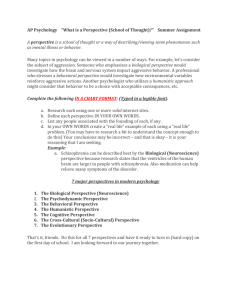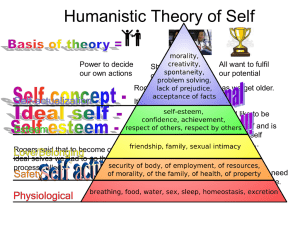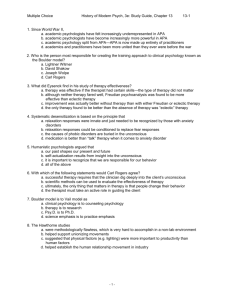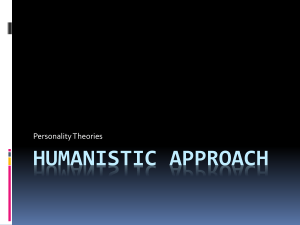Evaluating the Humanistic Perspective
advertisement
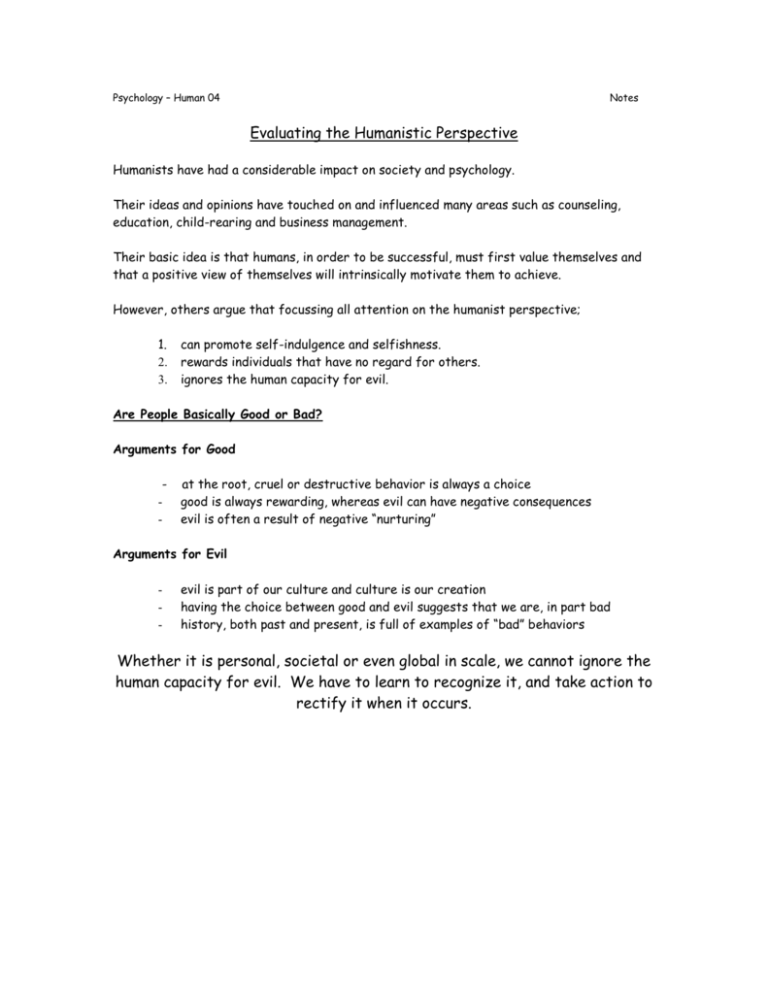
Psychology – Human 04 Notes Evaluating the Humanistic Perspective Humanists have had a considerable impact on society and psychology. Their ideas and opinions have touched on and influenced many areas such as counseling, education, child-rearing and business management. Their basic idea is that humans, in order to be successful, must first value themselves and that a positive view of themselves will intrinsically motivate them to achieve. However, others argue that focussing all attention on the humanist perspective; 1. 2. 3. can promote self-indulgence and selfishness. rewards individuals that have no regard for others. ignores the human capacity for evil. Are People Basically Good or Bad? Arguments for Good - at the root, cruel or destructive behavior is always a choice good is always rewarding, whereas evil can have negative consequences evil is often a result of negative “nurturing” Arguments for Evil - evil is part of our culture and culture is our creation having the choice between good and evil suggests that we are, in part bad history, both past and present, is full of examples of “bad” behaviors Whether it is personal, societal or even global in scale, we cannot ignore the human capacity for evil. We have to learn to recognize it, and take action to rectify it when it occurs. Psychology – Human 04 Assignment Evaluating the Humanistic Perspective Good, Bad or Just Plain Crazy?!? Directions: READ the handout entitled Evaluating the Humanistic Perspective by David G Myer and then answer the following paragraph response question. 1. Paragraph Response: In 2 or 3 paragraphs, discuss the validity of the humanistic perspective. Do you agree with the concept of self-esteem and Maslow’s Self Actualizing Person? What is the key to happiness and success? Do humanists ignore the human capacity for evil and if so, is this a good or bad thing. Offer your feeling and opinions, but back up your statements with evidence or examples. You will be marked out of 10 for your thoroughness, insight and overall quality of work. Total: ____/10 Psychology – Human04 Reading Evaluating the Humanistic Perspective An excerpt from Psychology – 3rd ed., David G. Myers One thing said of Freud can also be said of the humanistic psychologists: their impact has been pervasive. Their ideas have influenced counseling, education, child rearing, and management. They have also influenced – sometimes in ways they did not intend – much of today’s popular psychology. It is through popular psychology that many of us absorb some of what Maslow and Rogers so effectively taught – that a positive self-concept is key to happiness and success, that acceptance and empathy help nurture positive feelings about oneself, and that people are basically good and capable of self-improvement. The National Opinion Research Center (1985) reports that by a 4 to 1 margin, Americans now believe “human nature is basically good” rather than “fundamentally perverse and corrupt.” Humanistic psychologists can also take satisfaction in the dramatically different responses today from those of 50 years ago to one of the MMPI1 statements: Among those in the 1930s normal standardization sample, only 9 percent agreed that “I am an important person.” In the mid-1980s, more than half of the new sample agreed with the statement. And responding to a 1989 Gallup Poll, 85 percent of Americans rated “having a good self-image or self-respect” as VERY important; 0 percent rated it unimportant. Humanistic psychology’s message has been heard. The prominence of the humanistic perspective set off a backlash of criticism. First, said the critics, its concepts are vague and subjective. Consider the description of selfactualizing people as open, spontaneous, loving, self-accepting, and productive. Is this really a scientific description? Or is it merely a description of Maslow’s personal values and ideals? What Maslow did, noted M. Brewster Smith (1979), was offer impressions of his own personal heroes – perhaps Napoleon, Alexander the Great and John D. Rockefeller Sr. This theorist would likely describe self-actualizing people as “undeterred by the needs of others,” “motivated to achieve,” and “obsessed with power.” Second, some critics object to the idea that, as Carl Rogers put it, “The only question which matters is, “Am I living in a way which is deeply satisfying to me, and which truly expresses me?” (quoted by Wallach & Wallach, 1985). Indeed it is those who focus not on themselves but beyond themselves who are most likely to experience social support, to enjoy life and to cope effectively with stress (Crandall, 1984). Humanistic psychologists rebut such objections. They counter that belligerence, hostility, and insensitivity are often traceable to a poor self-concept. Moreover, they argue, selflove is actually the first step toward loving others. MMPI – Minnesota Multiphasic Personality Inventory – The most widely researched and clinically used of all personality tests. Originally developed to identify the traits for emotionally troubled people (still considered its most appropriate use), this test is now also used for other screening purposes. 1 Finally, the humanistic psychologists have been accused of failing to appreciate the reality of our human capacity for evil. Faced with assaults on the environment, overpopulation, and the treats of naïve optimism that denies the threat (“People are basically good; everything will work out”). The other is a dark despair (“It’s hopeless; why try?”). Action requires enough realism to fuel concern and enough optimism to provide hope. Humanistic psychology, say the critic, encourages the needed hope, but not the equally necessary realism. Mini Debate – Are people Basically Good? Two Humanistic Psychologists Debate Car Rogers: Yes Though I am very well aware of the incredible amount of destructive, cruel malevolent behavior in today’s world – from the threats of war to the senseless violence in the streets – I do not find that this evil in inherent in human nature. In a psychological climate, which is nurturant of growth and choice, I have never known an individual to choose the cruel or destructive path. Choice always seems to be the direction of greater socialization and improved relationships with others. So my experience leads me to believe that it is cultural influences which are the major factor in our evil behaviors. The rough manner of childbirth; the infant’s mixed experience with the parents; the constricting, destructive influence of our education system; the injustice of our distribution of wealth; our cultivated prejudices against individuals who are different – all these elements and many others warp the human organism in directions which are antisocial. So I see members of the human species, like members of other species, as essentially constructive in their fundamental nature, but damaged by their experience. (1981) Rolo May : No Culture admittedly has powerful effects on us. But it could not have these effects were these tendencies not already present in us. Who makes up the culture except persons like you and me? The culture is evil as well as good because we, the human beings who constitute it, are evil as well as good. We are bundles of both evil and good potentialities. Some people who join and lead the humanistic movement do so in order to find a haven, a port in the storm, a community of the like-minded persons who also are playing possum to the evils about us. Life, tome, is not a requirement to live out a preordained pattern of goodness, but a challenge coming down through the centuries out of the fact that each of us can throw the lever toward good or evil. This seems to me to require the age-old religious truths of mercy and forgiveness and it leaves no place for self-righteousness. (1982)

